南京大学2010年考博英语答案
[考研类试卷]2010年南京大学英语专业(基础英语)真题试卷.doc
![[考研类试卷]2010年南京大学英语专业(基础英语)真题试卷.doc](https://img.taocdn.com/s3/m/2cdba3177c1cfad6185fa711.png)
[ 考研类试卷 ]2010 年南京大学英语专业(基础英语)真题试卷一、名词解释0 For the definition given in each item in questions 11 to 15, find a matching word in the specified paragraph. The number given after each definition indicates the paragraph in which the word appears.(1x5)1pretension to knowledge not possessed(2)2adjustment(3)3appearing periodically(4)4display of narrow-minded learning(7)5bodies invisible to the naked eye(13)二、阅读理解6THE STUDY OF MANIrving S. Lee1The study of man—even, the scientific study—is ancient and respectable. It goes back to Aristotle, to Hippocrates, and beyond them to obscure beginnings. Today, it is one of the chief studies of the learned. Like our other activities, it may be divided into two parts, the successful part and the unsuccessful part. Speaking very generally and with due regard to numerous and important exceptions, it may be said that the successful part of the scientific study of man is related to medicine, the unsuccessful part to philosophy and to the social sciences. These relations are not only historical, they are also to be seen in methods, attitudes, and traditions.2The successes of medicine and the medical sciences have not been lightly won; from a multitude of failures, they are the survivals and the fortunate productions of tile best or the most-favored men among an endless succession of skillful physicians though pedantry, incompetency, and charlatanry have often hindered and, in evil times, even arrested the accumulations of medical science for long periods, since Hippocrates, at least, the tradition of skillful practice has never been quite lost the tradition that combines theory and practice. This tradition is, especially in three elements,indispensable.3Hippocrates teaches, first, hard, persistent, intelligent, responsible, unremitting labor in the sickroom, not in the library;the all-roundadaptation of the doctor to his task, anadaptation that is far from being merely intellectual. This is adaptation chiefly through the establishment of conditioned reflexes. Something like it seems to be a necessary part of the mastery of any material or of effective work in any medium.4Hippocrates teaches, secondly, accurate observation of things and events; selection, guided by judgment born of familiarity, of the salient and the recurrent phenomena; and their classification and methodical exploitation.5Hippocrates teaches, thirdly, the judicious construction of a theor—y not a philosophical theory, nor a grand effort of the imagination, nor a quas—i religious dogma, but a modest pedestrian affair, or perhaps I had better say, a useful walking stick to help on the way.6All this may be summed up thus: The physician must have, first, intimate habitual intuitive familiarity with things; secondly, a systematic knowledge of things; and thirdly, an effective way of thinking about things.7Experience shows that this is the way to success. It has long been followed in studying sickness, but hardly at all in studying the other experiences of daily life. Let us, therefore, consider more carefully what Hippocrates did and what he did not do. He was in reaction chiefly against three things: firstly, against the ancient, traditional myths and superstitions which still prevailed among the physicians of his day; secondly, against the recent intrusion of philosophy into medical doctrine; thirdly, against the extravagant system of diagnoses of the Cnidian School, a body of contemporary physicians who seem to have suffered from a familiar form of professional pedantry. Here, Hippocrates was opposing the pretentious systematization of knowledge that lacked solid, objective foundation—the concealment of ignorance, probably more or less unconsciously, with a show of knowledge. Note well that such concealment is rarely altogether dishonest and may be practised in thorough good faith.8The social sciences today suffer from defects that are not unlike the defects of medicine to which Hippocrates was opposed. Firstly, social and political myths are everywhere current, and if they involve forms of superstition that are less apparent to us than the medical superstitions of long ago, that may well be because we recognize the latter class of superstitions for what they are while still accepting or half accepting the former class. Secondly, there is at least as much philosophy mingled with our current social science as there was at any time in the medical doctrines ofthe Greeks. Thirdly, a great part of the social science of today consists of elaborate speculation on an insufficient foundation of fact.9Hippocrates endeavored to avoid myths and traditional rules, the grand search for philosophical truth, the authority of philosophical beliefs, the concealment of ignorance with a show of systematic knowledge. He was concerned, first of all not to conceal his own ignorance from himself.10Experience shows that there are two kinds of human behavior which it is ordinarily convenient and often essential to distinguish.11One is the thinking, talking, and writing, by those who are so familiar with relevant concrete experiences that they cannot ordinarily forget the facts, about two kinds of subjects. These are;firstly, concrete observation—s observations and experiences which are representable by means of sharply defined or otherwise unambiguous words; and secondly, more general considerations, dearly and logically related to such concrete observations and experiences.12The other kind of behavior is thinking, talking, and writing about vague or general ideas or "concepts" which do not clearly relate to concrete observations and experiences and which are not designated by sharply defined words.13In the social sciences, special methods and special skills are few. It is hard to think of anything that corresponds to a mathematician's skill in performing mathematical operations or to a bacteriologist's skill in cultivating microorganisms or to a clinician's skill in making physical examinations.14Classificatory, descriptive knowledge, which is so conspicuous in the medical sciences and in natural history and which has proved so essential to the development of such sciences, is relatively lacking in the social sciences. Moreover, there is no common accord among social scientists concerning the classes and subclasses of the things they study, and there is even much disagreement about nomenclature.15The theories of the social sciences seem to be in a curious state. One body of theory, that of economies is highly developed, has been cast in mathematical form, and has reached a stage that is thought to be in some respects definitive. This theory, like those of the natural sciences, is the result of the concerted efforts of a great number of investigators and has evolved in a manner altogether similar to the evolution of certain theories in the natural sciences. But it is hardly applicable to concrete reality.16The reasons why economic theory is so difficult to apply to concrete events are that it is an abstraction from an immensely complex reality and that reasoning from theory to practice is here, nearly always vitiated by "thefallacy of misplaced concreteness. " Such application suggests the analogy of applying Galileo's law of falling bodies to the motion of a falling leaf in a stiff breeze. Experience teaches that under such circumstances it is altogether unsafe to take more than a single step in deductive reasoning without verifying the conclusions by observation or experiment. Nevertheless, many economists, some cautiously and others less cautiously are in the habit of expressing opinions deduced from theoretical considerations concerning economic practice. There is here a striking contrast with medicine, where it is almost unknown for a theorist inexperienced in practice to prescribe the treatment of a patient.17In other fields of social science, theories are generally not held in common by all investigators, but, as in philosophical systems, tend to be sectarian beliefs. This is true even in psychology where the conflicts of physiological psychologists, behaviorists. Gestaltists, and others sometimes almost suggest theological controversy.18On the whole, it seems fair to say that the social sciences in general are not cultivated by persons possessing intuitive familiarity; highly developed, systematic, descriptive knowledge; and the kind of theories that are to be found in the natural sciences.19There is not a little system-building in the social sciences but, with the striking exception of economic theory, it is of the philosophical type rather than of the scientific type, being chiefly concerned in its structural elements with words rather than with things, or in old fashioned parlance, with noumena, rather than with phenomena.20A further difference between most system-building in the social sciences and systems of thought and classification of the natural sciences is to be seen in their evolution. In the natural sciences, both theories and descriptive systems grow by adaptation to the increasing knowledge and experience of the scientists. In the social sciences, systems often issue fully formed from the mind of one man. Then they may be much discussed if they attract attention, but progressive adaptive modification as a result of the concerted efforts of great numbers of men is rare. Such systems are in no proper sense working hypotheses; they are "rationalizations" , or, at best mixtures of working hypotheses and "rationalizations".21Thinking in the social sciences suffers, I believe, chiefly from two defects:One is the fallacy of misplaced concreteness; the other, the intrusion of sentimen—tsof Bacon's Idols—into the thinking, which may be fairly regarded as an occupational hazard of the social scientists.22Sentiments have no place in clear thinking, but the manifestations of sentiments are among the most important things with which the social sciences are concerned. For example, the word "justice" is out of place in pleadingbefore the Supreme Curt of the United States, but the sentiments associated with that word and often expressed by it are probably quite as important as the laws of our country, not to mention the procedure of the Supreme Court. Indeed such sentiments seem to be in many ways and at many times the most important of all social forces.23The acquired characters of men may be divided into two classes. One kind involves much use of reason, logic, the intellect; for example, the ordinary studies of school and university. The other kind involves little intellectual activity and arises chiefly from conditioning from rituals and from routines; for example, skills, attitudes, and acquired sentiments. In modified form, men share such acquired characters with dogs and other animals. When not misinterpreted, they have been almost completely neglected by intellectuals and are frequently overlooked by social scientists. Their study seems to present an opportunity for the application of physiology.24The conclusions of this comparative study are as follows: Firstly, a combination of intimate, habitual, intuitive familiarity with things; systematic knowledge of things; and an effective way of thinking about things is common among medical scientists, rare among social scientists. Secondly, systems in the medical sciences and systems in the social sciences are commonly different. The former resemble systems in the other natural sciences, the latter resemble philosophical systems. Thirdly, many of the terms employed currently in the social sciences are of a kind that is excluded, except by inadvertence, from the medical sciences. Fourthly, sentiments to not ordinarily intrude in the thinking of medical scientists; they do ordinarily intrude in the thinking of social scientists. Fifthly, the medical sciences have made some progress in the objective study of the manifestations of sentiments; the social sciences, where these things are particularly important, have neglected them. This is probably due to the influence of the intellectual tradition " Sixthly" in the medical sciences, special methods and special skills are many; in the social sciences, few. Finally, in the medical sciences, testing of thought by observation and experiment is continuous. Thus, theories and generalizations of all kinds are constantly being corrected, modified, and adapted to the phenomena; and fallacies of misplaced concreteness, eliminated. In the social sciences, there is little of this adaptation and correction through continuous observation and experiment.25These are very general conclusions to which, as I have already said, there are numerous and important exceptions. Perhaps the most important exceptions may be observed in the work of many historians, of purely descriptive writers, and of those theoretical economists who scrupulously abstain from the application of theory to practice.6Hippocrates was chiefly concerned with .( A)not concealing his own ignorance from himself( B)combining philosophy with medical doctrine( C)the system of diagnosis of the Cnidian school( D)pretentious systematization of knowledge( E)incorporating tradition with systematic knowledge7Most social science systems are, at best, .( A)mixtures of working hypotheses and rationalizations( B)results of concerted efforts of men at adaptive modification( C)adaptations of experience and increasing knowledge to experiments( D)highly developed systems of knowledge( E)studies of the structural elements of things8One branch of the social sciences considered in some respects definitive is .( A)history( B)philosophy( C)sociology( D)politics( E)economics9The social sciences today suffer from defects similar to the defects of medicine in Hippocrates' day, as evidenced by all but one of thesestatements. Which one?( A)Forms of superstition are less apparent today because we half accent them.( B)The concealment of ignorance is as thoroughly dishonest today as it was before.( C)Elaborate speculation is based on poor foundation of fact.( D)Much philosophy is mingled with current social science.( E)Social and political myths are everywhere current.10The tradition of skillful medical practice since Hippocrates' time combines theory and practice. Which description inaccurately represents this tradition?( A)Hard, persistent, intelligent, unremitting labor in the sickroom.( B)Evidence of accurate observation, selection, classification, and methodical exploitation of phenomena.( C)Judicious construction of a modest workable theory.( D)Hard, responsible, intelligent, unremitting labor in the library.( E)All-round adaptation of the doctor to his task as a type of master workman.11The author firmly believes the scientific study of men .( A)comparative religion( B)natural philosophy( C)social science( D)medical science( E)theoretical economics12Which of the following is NOT a conclusion of the author based on his comparative study?( A)Effective thinking is rare among social scientists.( B)In the medical sciences, testing of thought by observation and experiment is continuous.( C)Sentiments ordinarily intrude in the thinking of medical scientists.( D)Social sciences have neglected the objective study of the manifestations of sentiments.( E)Terms employed in the social sciences are of a kind excluded from the medical sciences.13By "the fallacy of misplaced concreteness" , the author means .( A)apprenticeship in a hospital is the only effective preparation for practice( B)the expressing of opinions deduced from theoretical considerations rather than experiment and observation( C)the prescribing of treatment for a patient by an experienced intern( D)treatment of illness by specialists in each field( E)theoretical deductions verified by observation and experimentation14According to the writer, the social sciences suffer from both the fallacy of misplace concreteness and .( A)excessive experimentation( B)judicious theory construction( C)intrusion of sentiments( D)too much observation and checking( E)ancient myths15One may infer that the author's views are .( A)universally accepted by medical students( B)accepted by social scientists( C)not acceptable to Gestaltists( D)parallel to those of economists( E)disputed by many professions15For the given word in each item in questions 16 to 20, decide which semantic variation best conveys the meaning of the author. The number given after each word indicates the paragraph in which the word appears.(1x5)16prevailed(7)( A)existed widely( B)produced the desired effect( C)gained the advantage17 pretentious(7)( A)assumptive of dignity( B)making exaggerated show; ostentatious( C)claiming importance or title18 conspicuous(14)( A)readily attracting attention; striking( B)plainly visible; manifest( C)undesirably noticeable19 fallacy(16)( A)false idea( B)deceitfulness( C)erroneous reasoning 20 sectarian(17)( A)pertaining to a particular school of thought( B)member of a sect( C)bigoted三、句子改错21All high schools attach great importance youngster's performance in the College Entrance Examinations.22He could not say "hippopotamus" and "pomegranate" , and we had to help him to pronounce.23"How to open the door?" , he asked as he turned the key, but the door did not open.24This was a farm where you could find all kinds of birds: chickens, quails, turkeys, ducks and geese and so on.25The boy biked to school but realized that he has forgotten his homework.26It was bad news that all boys in the class were caught skipping the PEclass. Another news, however, was encouraging:all of them passed the math exam.27The teacher got impatient that after explaining the past tense many times and giving many examples, the pupils still wrote "I play football yesterday".28All the sophomores said that they wanted to be a good student.29The teacher found it dissatisfied that students failed to hand in their homework on time.30 A wrong information he gave me is that our shuttle bus leaves at 3. As a result, I missed it.四、汉译英31Translate the following passage into English.(25)建城近2500年来,南京一直是中国多元文化交融共进的中心城市之一。
南京大学考博英语模拟真题及其解析
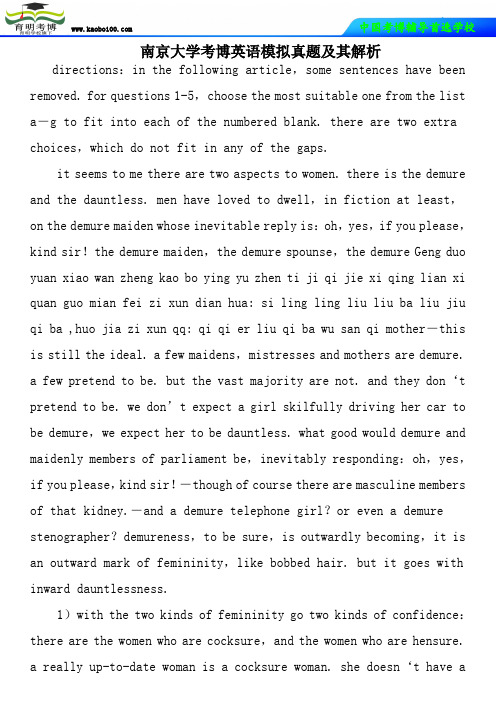
南京大学考博英语模拟真题及其解析directions:in the following article,some sentences have been removed.for questions1-5,choose the most suitable one from the list a―g to fit into each of the numbered blank.there are two extra choices,which do not fit in any of the gaps.it seems to me there are two aspects to women.there is the demure and the dauntless.men have loved to dwell,in fiction at least,on the demure maiden whose inevitable reply is:oh,yes,if you please,kind sir!the demure maiden,the demure spounse,the demure Geng duo yuan xiao wan zheng kao bo ying yu zhen ti ji qi jie xi qing lian xi quan guo mian fei zi xun dian hua:si ling ling liu liu ba liu jiu qi ba,huo jia zi xun qq:qi qi er liu qi ba wu san qi mother―this is still the ideal.a few maidens,mistresses and mothers are demure.a few pretend to be.but the vast majority are not.and they don‘t pretend to be.we don’t expect a girl skilfully driving her car to be demure,we expect her to be dauntless.what good would demure and maidenly members of parliament be,inevitably responding:oh,yes,if you please,kind sir!―though of course there are masculine members of that kidney.―and a demure telephone girl?or even a demure stenographer?demureness,to be sure,is outwardly becoming,it is an outward mark of femininity,like bobbed hair.but it goes with inward dauntlessness.1)with the two kinds of femininity go two kinds of confidence:there are the women who are cocksure,and the women who are hensure.a really up-to-date woman is a cocksure woman.she doesn‘t have adoubt nor a qualm.she is the modern type.whereas the old-fashioned demure woman was sure as a hen is sure,that is,without knowing anything about it.she went quietly and busily cluciking around,laying the eggs and mothering the chickens in a kind of anxious dream that still was full of sureness.but not mental sureness.her sureness was a physical condition,very soothing,but a condition out of which she could easily be startled or frightened.it is quite amusing to see the two kinds of sureness in chickens. the cockerel is,naturally,cocksure.he crows because he is certain it is day.,then the hen peeps out from under her wing.he marches to the door of the henhouse and pokes out his lead assertively:ah ha!daylight,of course,just as i said!―and he majestically steps down the chicken ladder towards terra firma,knowing that the hens will step cautiously after him,drawn by his confidence.so after him,cautiously,step the hens.he crows again:ha-ha!here we are!―it is indisputable,and the hens accept it entirely.he marches towards the house.from the house a person ought to appear,scattering corn. why does the person not appear?the cock will see to it.he is cocksure. he gives a loud crow in the doorway,and the person appears.the hens are suitably impressed but immediately devote all their henny consciousness to the scattered corn,pecking absorbedly,while the cock runs and fusses,cocksure that he is responsible for it all.so the day goes on.the cock finds a tit-bit,and loudly calls the hens.they scuffle up in henny surety,and gobble the tit-bit.but when they find a juicy morsel for themselves,they devour it in silence,hensure.unless,of course,there are little chicks,when they most anxiously call the brood.but in her own dim surety,the hen is really much surer than the cock,in a differenty way.she marches off to lay her egg,she secures obstinately the nest she wants,she lays her egg at last,then steps forth again with prancing confidence,and gives that most assured of all sounds,the hensure cackle of a bird who has laid her egg.the cock,who is never so sure about anything as the hen is about the egg she has laid,immediately starts to cackle like the female of his species.he is pining to be hensure,for hensure is so much surer than cocksure.nevertheless,cocksure is boss.when the chickenhawk appears in the sky,loud are the cockerel‘s calls of alarm.then the hens scuffle under the verandah,the cock ruffles his feathers on guard.the hens are numb with fear,they say:alas,there is no health in us!how wonderful to be a cock so bold!―and they huddle,numbed.but their very numbness is hensurety.just as the cock can cackle,however,as if he had laid the egg,so can the hen bird crow.she can more or less assume his cocksurensess.2)it seems to me just the same in the vast human farmyard.only nowadays all the cocks are cackling and pretending to lay eggs,and all the hens are crowing and pretending to call the sun out of bed.3)so the women step forth with a good loud cock-a-doodle-do!the tragedy about cocksure women is that they are more cocky,in their assurance,than the cock himself.they never realize that when the cock gives his loud crow in he morning,he listens acutely afterwards,to hear if some other wretch of a cock dare crow defiance,challenge.to the cock,there is always defiance,challenge,danger and death on the clear air;or the possibility thereof.but alas,when the hen crows,she listens for no defiance or challenge.when she says cock-a-doodle-do!then it is unanswerable. the cock listens for an answer,alert.but the hen knows she is unanswerable.cock-a-dooodle-do!and there it is,take it or leave it!4)it is the tragedy of the modern woman.she becomes cocksurem,she puts all her passion and energy and years of her life into some effort or assertion,without ever listening for the denial which she ought to take into count.she is cocksure,but she is a new all the time.frightened of her own henny self,she rushes to mad lengths about votes,or welfare,or sports,or business:she is marvellous,out-manning the man.but alas,it is all fundamentally disconnected. it is all an attitude,and one day the attitude will become a weird cramp,a pain,and then it will collapse.and when it has collapsed,and she looks at the eggs she has laid,votes,or miles of typewriting,years of business efficiency―suddenly,because she is a hen and not a cock,all she has done will turn into pure nothingness to her.5)[a]if women today are cocksure,men are hensure.men are timid,tremulous,rather soft and submissive,easy in their very henliketremulousness.they only want to be spoken to gently.[b]the girl who has got to make her way in life has got to be dauntless,and if she has a pretty,demure manner with it,then luck girl.she kills two birds with two stones.[c]conventional ideas about women seems pretty much cut and dried in the modern society.[d]and yet she is never so easy,cocksure,as she used to be when she was hensure.cocksure,she is cocksure,but uneasy.hensure,she trembles,but is easy.[e]and it is this that makes the cocksureness of women so dangerous,so devastating.it is really out of scheme,it is not in relation to the rest of things.so we have the tragedy of cocksure women.they find,so often,that instead of having laid an egg,they have laid a vote,or an emply ink-bootle,or some other absolutely unhatchable object,means nothing to them.[f]but the women pointed out the men had not produced anything,and the human race was pretty much starving.[g]suddenly it all falls out of relation to her basic henny self,and she realizes she has lost her life.the lovely henny surety,the hensureness which is the real bliss of every female,has been denied her:she had never had it.having lived her life with such utmost strenuousness and cocksureness,she has missed her life altogether. nothingness!答案及解析1)b.为生计所打拼的女孩子不得不勇敢无畏,如果她举止又温驯娴淑,那么她就是个幸运的女孩子。
2010年全国医学博士外语统一考试英语试题参考答案及解析
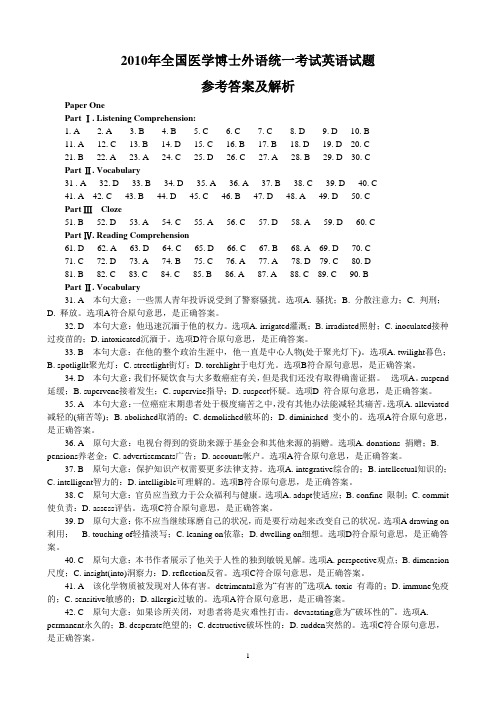
2010年全国医学博士外语统一考试英语试题参考答案及解析Paper OnePart Ⅰ. Listening Comprehension:1. A2. A3. B4. B5. C6. C7. C8. D9. D 10. B11. A 12. C 13. B 14. D 15. C 16. B 17. B 18. D 19. D 20. C21. B 22. A 23. A 24. C 25. D 26. C 27. A 28. B 29. D 30. CPart Ⅱ. Vocabulary31 . A 32. D 33. B 34. D 35. A 36. A 37. B 38. C 39. D 40. C41. A 42. C 43. B 44. D 45. C 46. B 47. D 48. A 49. D 50. CPart ⅢCloze51. B 52. D 53. A 54. C 55. A 56. C 57. D 58. A 59. D 60. CPart Ⅳ. Reading Comprehension61. D 62. A 63. D 64. C 65. D 66. C 67. B 68. A 69. D 70. C71. C 72. D 73. A 74. B 75. C 76. A 77. A 78. D 79. C 80. D81. B 82. C 83. C 84. C 85. B 86. A 87. A 88. C 89. C 90. BPart Ⅱ. Vocabulary31. A 本句大意:一些黑人青年投诉说受到了警察骚扰。
选项A. 骚扰;B. 分散注意力;C. 判刑;D. 释放。
选项A符合原句意思,是正确答案。
32. D 本句大意:他迅速沉湎于他的权力。
选项A. irrigated灌溉;B. irradiated照射;C. inoculated接种过疫苗的;D. intoxicated沉湎于。
南京大学考博英语真题2006-2008年答案
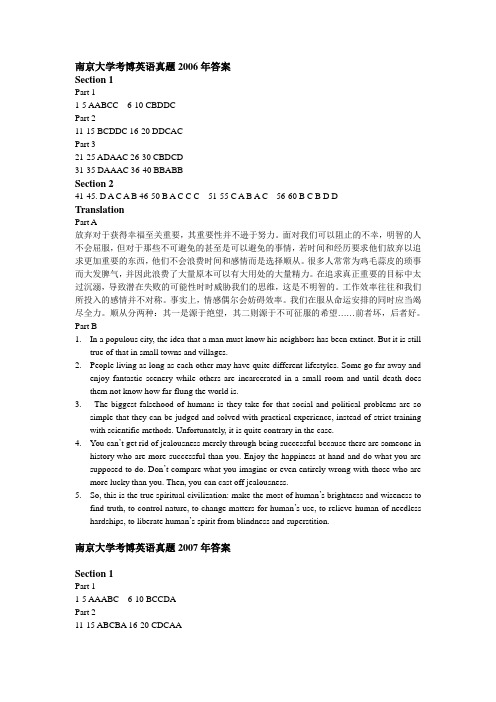
南京大学考博英语真题2006年答案Section 1Part 11-5 AABCC 6-10 CBDDCPart 211-15 BCDDC 16-20 DDCACPart 321-25 ADAAC 26-30 CBDCD31-35 DAAAC 36-40 BBABBSection 241-45. D A C A B 46-50 B A C C C 51-55 C A B A C 56-60 B C B D DTranslationPart A放弃对于获得幸福至关重要,其重要性并不逊于努力。
面对我们可以阻止的不幸,明智的人不会屈服,但对于那些不可避免的甚至是可以避免的事情,若时间和经历要求他们放弃以追求更加重要的东西,他们不会浪费时间和感情而是选择顺从。
很多人常常为鸡毛蒜皮的琐事而大发脾气,并因此浪费了大量原本可以有大用处的大量精力。
在追求真正重要的目标中太过沉溺,导致潜在失败的可能性时时威胁我们的思维,这是不明智的。
工作效率往往和我们所投入的感情并不对称。
事实上,情感偶尔会妨碍效率。
我们在服从命运安排的同时应当竭尽全力。
顺从分两种:其一是源于绝望,其二则源于不可征服的希望……前者坏,后者好。
Part B1.In a populous city, the idea that a man must know his neighbors has been extinct. But it is stilltrue of that in small towns and villages.2.People living as long as each other may have quite different lifestyles. Some go far away andenjoy fantastic scenery while others are incarcerated in a small room and until death does them not know how far-flung the world is.3.The biggest falsehood of humans is they take for that social and political problems are sosimple that they can be judged and solved with practical experience, instead of strict training with scientific methods. Unfortunately, it is quite contrary in the case.4.You can’t get rid of jealousness merely through being successful because there are someone inhistory who are more successful than you. Enjoy the happiness at hand and do what you are supposed to do. Don’t compare what you imagine or even entirely wrong with those who are more lucky than you. Then, you can cast off jealousness.5.So, this is the true spiritual civilization: make the most of human’s brightness and wiseness tofind truth, to control nature, to change matters for human’s use, to relieve human of needless hardships, to liberate human’s spirit from blindness and superstition.南京大学考博英语真题2007年答案Section 1Part 11-5 AAABC 6-10 BCCDAPart 211-15 ABCBA 16-20 CDCAAPart 321-25 CADBA 26-30 BAAACSection 231-34 B D B C 35-38 D A B D 39-42 B C A B 43-46 D D D C 47-50 B A C BTranslationPart A可以肯定的是,今天的人们对于成功的渴望以及其为我们带来的好处绝不亚于过去。
2009年度江苏南京大学考博英语试卷及解答

2009年江苏南京大学考博英语试卷及解答题型有:1. Structure and Vocabulary 2. Cloze 3. Reading Comprehension 4. English-Chinese Translation 5. Chinese-English TranslationStructure and Vocabulary1. The government has to decide whether cost or concern for the environment should take______ when choosing the route for the new road crossing the well-known scenic spot.A.solutionB.sightC.intellectD.precedence正确解答:D解析:句子大意为:当准备穿过这个著名的风景区修建一条道路的时候,是成本第一还是环境第一,政府必须做个决定。
在给出的选项中:solution“解决方案”;sight“视力、景象”;intellect“智力”:precedence“优先”。
所以,正确解答是D。
2. Trimmer is known as a tough manager who demands ______results.A.credibleB.undeniableC.dynamicD.tangible正确解答:B解析:句子大意为:特里默是一位严厉的经理,他只要无可争辩的好结果。
在给出的选项中:credible“可信的”;undeniable“大家公认的、无可争辩的”;dynamic“动态的”;tangible“有形的、可感的”。
所以,正确解答是B。
3. He has been plowing through a biography of Lyndon Johnson and a ______ of Henry Kissinger.A.casualtyB.criteriaC.dissectionD.necessity正确解答:C解析:句子大意为:他正在阅读林登·约翰逊的传记和亨利·基辛格的解析。
2003~2006年南京大学考博英语真题及详解【圣才出品】
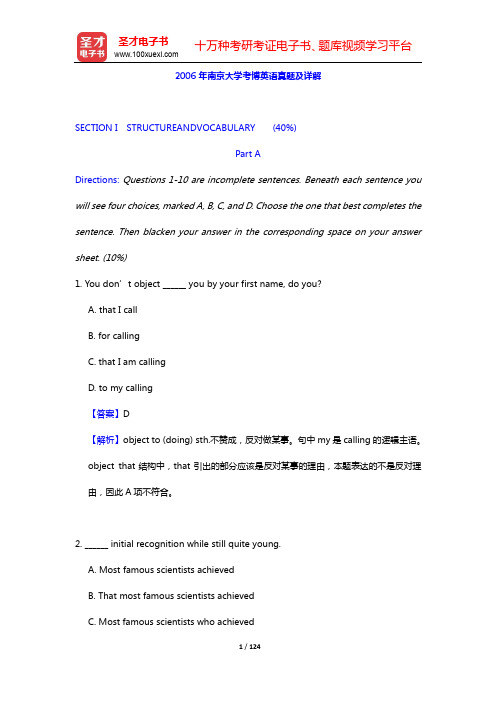
2006年南京大学考博英语真题及详解SECTION I STRUCTUREANDVOCABULARY (40%)Part ADirections: Questions 1-10 are incomplete sentences. Beneath each sentence you will see four choices, marked A, B, C, and D. Choose the one that best completes the sentence. Then blacken your answer in the corresponding space on your answer sheet. (10%)1. You don’t object ______ you by your first name, do you?A. that I callB. for callingC. that I am callingD. to my calling【答案】D【解析】object to (doing) sth.不赞成,反对做某事。
句中my是calling的逻辑主语。
object that结构中,that引出的部分应该是反对某事的理由,本题表达的不是反对理由,因此A项不符合。
2. ______ initial recognition while still quite young.A. Most famous scientists achievedB. That most famous scientists achievedC. Most famous scientists who achievedD. For most famous scientists to achieve【答案】A【解析】根据句子结构判断,空缺部分应该是句子主句部分,while引导的是时间状语,四个选项中,只有A项是独立、完整的句子。
2013年南京大学考博英语真题试卷(题后含答案及解析)

2013年南京大学考博英语真题试卷(题后含答案及解析)题型有:1. Structure and V ocabulary 2. Cloze 3. Reading Comprehension 4. English-Chinese Translation 5. Chinese-English TranslationStructure and V ocabulary1.Shoes of this kind are______to slip on wet ground.A.feasibleB.approprateC.aptD.fitting正确答案:C解析:近义词辨析。
feasible“可行的”;appropriate“适当的,恰当的”;apt “恰当的,有……倾向的”;fitting“适合的,适宜的”。
根据语义“这样的鞋子在湿地上很容易打滑。
”可知,C选项意为“有……倾向的”,符合句意,因此本题选C。
2.I bought an alarm clock with a(n)______dial which can be seen clearly in the dark.A.supersonicB.luminousC.audibleD.amplified正确答案:B解析:形容词词义辨析。
supersonic“超音速的,超声波的”;luminous“发光的,明亮的”;audible“听得见的”;amplified“放大的,扩充的”。
根据空格后部分“在黑夜里也可以看得很清楚”可以判断空格处应填入与光亮相关的词,故答案为B。
3.Her jewelry______under the spotlights and she became the dominant figure at the ball.A.glaredB.glitteredC.blazedD.glowed正确答案:B解析:近义词辨析。
四个选项都有“发光”的意思,但glare强调发炫光,发耀眼的强光,通常指光亮平滑的表面发出的光;glitter指闪闪地发光,发光点较小;blaze指猛烈燃烧所发出强烈的光;glow多指像冶炼铁和钢时发出的红光。
2010年南京大学考博英语真题试卷(题后含答案及解析)
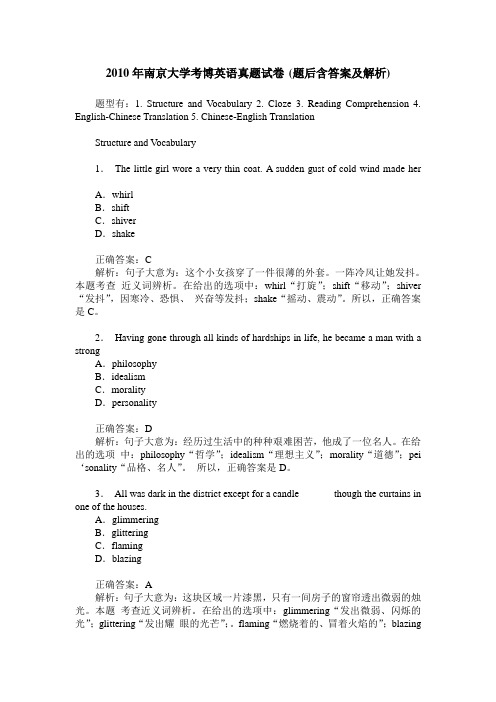
2010年南京大学考博英语真题试卷(题后含答案及解析)题型有:1. Structure and V ocabulary 2. Cloze 3. Reading Comprehension 4. English-Chinese Translation 5. Chinese-English TranslationStructure and V ocabulary1.The little girl wore a very thin coat. A sudden gust of cold wind made her ______A.whirlB.shiftC.shiverD.shake正确答案:C解析:句子大意为:这个小女孩穿了一件很薄的外套。
一阵冷风让她发抖。
本题考查近义词辨析。
在给出的选项中:whirl“打旋”;shift“移动”;shiver “发抖”,因寒冷、恐惧、兴奋等发抖;shake“摇动、震动”。
所以,正确答案是C。
2.Having gone through all kinds of hardships in life, he became a man with a strong______A.philosophyB.idealismC.moralityD.personality正确答案:D解析:句子大意为:经历过生活中的种种艰难困苦,他成了一位名人。
在给出的选项中:philosophy“哲学”;idealism“理想主义”;morality“道德”;pei ‘sonality“品格、名人”。
所以,正确答案是D。
3.All was dark in the district except for a candle ______ though the curtains in one of the houses.A.glimmeringB.glitteringC.flamingD.blazing正确答案:A解析:句子大意为:这块区域一片漆黑,只有一间房子的窗帘透出微弱的烛光。
